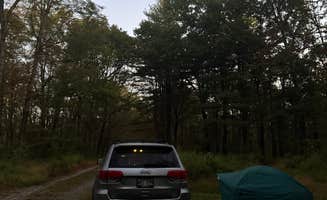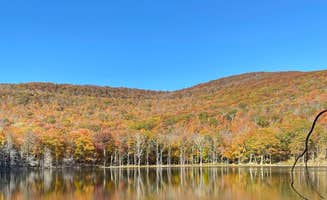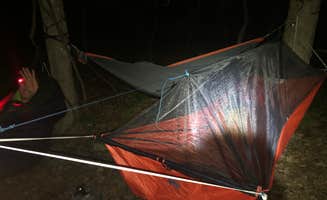Primitive camping near Norfolk, Connecticut provides wilderness experiences across multiple state lines with varying terrain and regulations. Most sites require carrying in supplies and practicing Leave No Trace principles. Connecticut's northwestern corner features relatively higher elevations compared to coastal regions, with dispersed sites concentrated in neighboring Massachusetts and New York state forests.
What to do
Hiking opportunities: The Jug End Dispersed area connects with the Appalachian Trail, offering both day hikes and backpacking options. "I have section hiked the majority of the east coast AT and this is in my top 10 spots to stay at," reports Luke A., highlighting its popularity among through-hikers.
Climbing access: Hemlock Ridge MUA Dispersed serves primarily as overnight accommodation for rock climbers. Cory D. notes, "Many climbers stay there for access to the gunks," referring to the nearby Shawangunk Mountains, a premier climbing destination in the Northeast.
Lake activities: Echo Lake provides opportunities for swimming and fishing during warmer months. According to Kate, "There are tent sites around the whole lake with fire pits and 1 lean-to site at the end of the trail when you first arrive at the lake." The water access makes this a popular option for those wanting to cool off after hiking.
What campers like
Privacy between sites: Sage's Revine offers good separation between camping platforms. Luke A. notes there are "50 feet between platforms" and it's "right over the border of CT into MA on the Appalachian Trail," providing a balance of solitude and accessibility.
Scenic viewpoints: Elevated campsites at Echo Lake provide panoramic views. James A. reports, "We camped on the hill with a beautiful view of the whole lake and breeze," highlighting the advantage of higher-elevation sites for both views and natural cooling.
Cell service availability: Despite the backcountry feel, some areas maintain connectivity. At Taconic Hereford Multiple Use Park, Doc B. describes "hiking in and finding a suitable place to make camp has the feeling of the wild, with the safety of having full cell service," an important consideration for those needing to stay connected.
What you should know
Limited amenities: Most sites lack basic facilities. Dawn M. describes Hemlock Ridge MUA: "There are absolutely no amenities whatsoever & barely even a signal here, but it's quiet & off the beaten path."
Conflicting regulations: Always verify current camping rules before visiting. Regarding Jug End, licia S. warns, "This is a hiking trail only- no camping per website: https://www.mass.gov/locations/jug-end-state-reservation-wildlife-management-area," contradicting other information.
Bear awareness: Food storage is necessary in this region. Luke A. mentions Sage's Revine has "bear boxes available," indicating black bears are present in the area and proper food storage is essential.
Limited parking: Plan to arrive early at popular sites. Dawn M. notes that at Hemlock Ridge, "The parking lot only holds about 4-5 cars, 6 if you park real tight," which can be problematic during peak seasons.
Tips for camping with families
Lean-to availability: Taconic Hereford Multiple Use Park offers easier shelter options for families. While primarily a primitive camping area, licia S. mentions it has "Great looking facilities and friendly staff," making it more accessible for those with children.
Bug preparation: Pack appropriate insect protection, especially near water. Kate warns about Echo Lake: "Note, it can get swampy near the edge of the lake so you may want to bring bug spray."
Trail difficulty assessment: Some access routes may challenge younger hikers. James A. cautions that at Echo Lake, "Other campsites are scattered and require navigating through small overgrown trails (wear pants)," suggesting families should prepare accordingly.
Tips from RVers
No vehicle access: Traditional RVs cannot access these primitive sites. Most locations explicitly indicate "hike-in" or "walk-in" access only, with no accommodation for motorized camping.
Base camp alternatives: Use established campgrounds as launching points for day trips to primitive areas. The nearest developed campgrounds with RV facilities are located 20-30 miles from Norfolk, requiring planning for those using larger vehicles as base camps for wilderness exploration.




